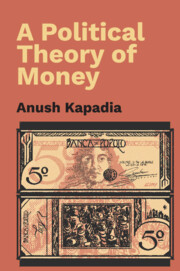10 - Proof of Institutions: Cryptocurrencies as Digital Fiat Money
Published online by Cambridge University Press: 14 September 2023
Summary
Can we design money without hierarchy, instability and state power? Tech utopians have tried with Bitcoin. Their failure arguably proves that these are indeed fundamental elements of money. Hierarchy emerges willy-nilly in Bitcoin and other cryptocurrencies: ‘central planner’ software architects write the code; ‘mining’ is monopolised; exchanges issue crypto-backed IOUs like banks. Bitcoin could function as a token ‘outside money’ in principle, but its rigidity would be over-disciplining, emulating the anti-democratic gold standard. Bitcoiners’ hostility towards credit is understandable given the political capture of credit systems, but it perhaps ought to be directed at this capture rather than the institution itself. Their techno-libertarianism misses the upside of the political nature of credit money, which allows citizens to relax their collective survival constraint.
Credit is a fundamental part of human sociality because economic life is a going concern, pointing relentlessly to the future. Money as credit is one method by which collectives, political and economic, undertake future-oriented action. Money as a digital fiat token cannot perform this coordinating task in principle, no matter how well engineered, because of its finitude, inflexibility and centrality, especially under conditions of capitalism plus democracy. If flexibility were engineered in, then cryptocurrencies would simply have recreated credit money in a new avatar.
Cryptocurrencies cannot function as money because they have as their target a limited notion of money and a thin idea of the work of social institutions. Designers of cryptocurrencies seek to replace human institutions with ingenious cryptographic functions. In identifying the enemy as fiat money, cryptocurrencies are simply solving the wrong problem. Yet in their failure, they prove the robustness of creditary institutions.
Despite their operational failure, cryptocurrencies succeed in highlighting the fact that money is always designed in accordance with some underlying politics. They thereby implicitly point to the possibility of more democratically designed money systems.
Monetary systems are inherently hierarchical and therefore highly susceptible to political capture. The solution to capture is institutional balance and accountability precisely because alternatives founded on decentralisation are not robust as the failure of cryptos as money illustrates. Indeed, such a decentralisation might be pernicious in its political and economic outcomes.
The technical fact of hierarchy in money condemns the polity to subjecting hierarchy to democratic discipline. There is no pathway that precludes hierarchy: accountable or unaccountable hierarchies are our only options (see Chapter 12).
- Type
- Chapter
- Information
- A Political Theory of Money , pp. 188 - 203Publisher: Cambridge University PressPrint publication year: 2024



